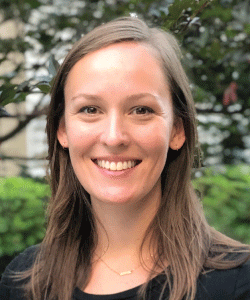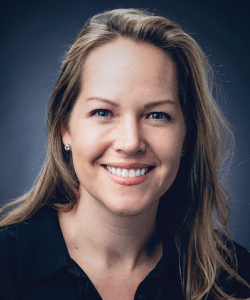Government Relations
Inside Grants: U.S. National Institutes of Health F32 Postdoctoral Fellowship
Postdoctoral fellow Virginia Salo and her mentor, APS Fellow Kathryn Humphreys, share insights on this early-career award.

External grant funding can provide an essential source of support to psychological science, helping researchers to tackle bigger questions, recruit more participants, purchase key infrastructure, facilitate student training, and more. In APS’s “Inside Grants” column, you’ll hear about the emerging research these grants are supporting.
The U.S. National Institutes of Health (NIH) provides opportunities for promising researchers to continue their training and develop their research skills via postdoctoral fellowship awards. One such fellowship award is the Ruth L. Kirschstein Postdoctoral Individual National Research Service Award, often called an “F32” for its code under NIH’s research-funding categorization system. A recent awardee is Virginia Salo, a psychological scientist who works primarily under the direction and mentorship of APS Fellow and Janet Taylor Spence Award recipient Kathryn Humphreys, a prior recipient of an F32 herself.
Grant Information
- Country: United States
- Agency: National Institutes of Health
- Institute: National Institute of Child Health and Human Development
- Grant Mechanism: Ruth L. Kirschstein National Research Service Award (NRSA) Individual Postdoctoral Fellowship (Parent F32)
- Amount: Provides varying stipends, contributions to tuition, and institutional allowances
Salo is a postdoctoral fellow in the Department of Psychology and Human Development at Vanderbilt University. She has worked with Humphreys since October 2018. Salo was awarded an F32 through the National Institute of Child Health and Human Development for a project titled “Infant Motor Experience and Caregiver Perceptions of Infant Intentionality: Examining Transactional Processes of Development.”
Working with a faculty mentor is an integral part of the NIH F32 postdoctoral fellowship. Humphreys is an assistant professor in the Department of Psychology and Human Development at Vanderbilt University, where she directs the Stress and Early Adversity Lab. Her training is in infant mental health and clinical psychology, and her program of research is broadly focused on understanding the influence of, and improving, children’s early experiences. Salo is co-mentored by APS Fellow Amy Needham, also a professor at Vanderbilt.

Virginia Salo
What were you researching before you received your grant, and where is your work going now?
My graduate work focused on infant social cognition—specifically, how infants learn from communicative interactions with their caregivers. My dissertation involved an intervention to encourage parents to use pointing gestures more often with their infant, and during the intervention sessions many parents expressed surprise to learn that their infant was ready to learn from, respond to, and even start producing pointing gestures. This made me wonder whether the way parents think about their child’s capabilities might influence their interactions and inspired me to shift to studying the parents’ perspective during my postdoctoral training.
I am lucky that I found a postdoc mentor, Kathryn Humphreys, whose interests closely align with mine and who also encourages me to pursue my own research interests. Working with Kate and my co-mentor, Amy Needham, we developed a series of two studies building off data-collection efforts in each of their labs to examine the links between motor skill development in infants, parents’ perceptions of their infants’ developing skills, and parents’ behavior. The underlying hypothesis is that parents interpret infant motor skills as correlated with social-cognitive skills, and parents’ perceptions of infant social-cognitive abilities can influence the way they interact with their child. In my first study, I am examining the effect of an infant object-apprehension intervention not only on infants’ motor skills but also on parents’ perceptions of their infant, and whether individual differences in parents’ perceptions mediate the relation between early motor experience and later skills. In my second study, I am examining the relation between parents’ perceptions of their infant and their parenting behavior.
How has government funding supported your research efforts?
Since the F32 directly supports my stipend, the greatest benefit of receiving this grant has been time. A postdoc is often a really packed period where you are learning new research and professional skills, wrapping up (or continuing) old research projects started in graduate school, and also immediately going on the job market. With the F32, I’ve been able to focus more time on the research and professional development aspects without the pressure of the clock ticking to start the job search immediately.
What was the F32 application process like?
The application process for an F32 entails basically the same amount of work as an R03 or R21 grant [popular NIH research grants] plus requiring a proposed training plan. If you are unfamiliar with the many different documents that go into an NIH grant, it can seem overwhelming at first. Thankfully, I had written an F31 [predoctoral fellowship] proposal in graduate school and, while it was not funded, that experience helped prepare me and set my expectations for writing the F32.
After my initial submission, my application was not discussed—essentially meaning it didn’t make the top 50% of all the applications that round—so I was honestly a bit shocked to have it funded on the second round. I think the key was being very responsive to each point of feedback I received from the reviewers, who thankfully provided constructive comments.
What advice do you have for researchers planning for NIH grants?
First, particularly for those thinking about applying for either an F31 or F32, it is easy to give all your attention to the research proposal, but it is important to treat the research and the training proposal as two equal and complementary pieces of the grant. Make sure that your training goals clearly build off of your past experiences and fill key holes which will best prepare you for your next career phase, and that your proposed research project clearly will provide those training experiences. Second, aim for a clean and feasible project with clearly defined benchmarks and products.

Kathryn Humphreys
How did your own F32 inform your support for Virginia Salo as a postdoctoral fellow?
When I submitted my own F32 proposal, it felt like if it was not funded, my academic career could have ended. I had no backup plan, and I was devastated when my first submission had received a score outside of the fundable range (the resubmission was funded). Thus, with Virginia’s postdoctoral plans, it was important for me to know I had funding set aside to support her should her proposal not be selected. In addition, I learned to think of the first submission as more of a trial run to give a chance to be responsive to reviewers. With Virginia’s initial submission, the main concern reviewers had was about me (specifically my status as a junior faculty member). We set out to remedy this by adding an experienced co-mentor, Amy Needham, to her team, and this allowed Virginia to be involved in projects in both labs and gain additional support.
What advice would you offer to potential postdoctoral fellows and mentors?
Applicants seem to have to walk a tightrope—they have to show that they are extremely talented, skilled, and experienced, but also that they are specifically missing exactly the training that would be provided should the proposal be funded. Picking projects that allow you to gain new skills that build from current expertise is important. To mentors, having a plan for funding the trainee regardless of whether the application is successful should be a prerequisite to sponsoring an application, because depending on an F32 to continue one’s career is too precarious.
The NIH F32 postdoctoral fellowship award can provide up to 3 years of support for research training; view the fellowship’s program page to learn more about stipends and contributions to tuition and fees provided to awardees.
Interested in learning more about funding opportunities for psychological scientists? Visit the Funding and Policy page on the APS website (psychologicalscience.org/policy) for updates.




